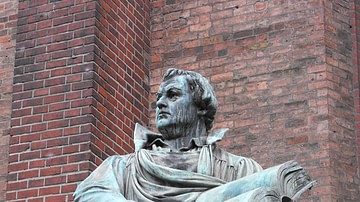Search
Search Results

Article
A Medieval Christmas
Christmas was one of the highlights of the medieval calendar, not only for the rich but also for the peasantry. For the longest holiday of the year, typically the full twelve days of Christmas, people stopped work, homes were decorated and...

Article
How Queen Victoria Celebrated Christmas - The Festive Traditions in the Royal Household
The way Queen Victoria (reign 1837-1901) and her family celebrated their Christmases became familiar to the public over the years, thanks to the intense media coverage of the royal family, particularly the regular features in popular illustrated...

Article
Luther's 97 Theses
Martin Luther's 95 Theses, credited with sparking the Protestant Reformation in Europe, have become a cultural touchstone since he posted them 31 October 1517, but the little-known 97 Theses, posted only a month earlier, are equally significant...

Article
The Rock-Cut Tombs of Qizqapan, Iraqi Kurdistan: Median or Achaemenid?
O Creator of the material world, at what distance from the holy man (should the place for the dead body be)?" Ahura Mazda replied: "Three paces from the holy man". (Vend. 8. 6-7) In September 2009 CE, one of my relatives suggested that we...

Article
Passover in the Hebrew Bible
Passover is a Jewish festival celebrated since at least the 5th century BCE, typically associated with the tradition of Moses leading the Israelites out of Egypt. According to historical evidence and modern-day practice, the festival was...

Article
Old Testament Pseudepigrapha
The Old Testament Pseudepigrapha are the non-canonical writings of Judaism and Christianity, ranging from the 5th century BCE to the 9th century CE. Pseudepigrapha comes from a Greek noun denoting writings with a false superscription or name...

Article
The Book of Jonah
The book of Jonah is the fifth book in the Christian canons and the Jewish Tanakh. It is one of 'Trei Asar' (The Twelve) prophets in the tanakh, and in Christian tradition as 'oi dodeka prophetai' or 'ton dodekapropheton' , Greek for "The...

Article
Ruth & Naomi
The story of Ruth and Naomi is found in the book of Ruth in the Jewish Scriptures. The Scriptures are traditionally divided into three sections: Torah (the first five books assigned to Moses), the Prophets (Nevi’im), and Writings (Ketuvim...

Definition
Mali Empire
The Mali Empire (1240-1645) of West Africa was founded by Sundiata Keita (r. 1230-1255) following his victory over the kingdom of Sosso (c. 1180-1235). Sundiata's centralised government, diplomacy and well-trained army permitted a massive...

Definition
Trojan War
The Trojan War was fought between Greeks and the defenders of the city of Troy in Anatolia sometime in the late Bronze Age. The story has grabbed the imagination for millennia but a conflict between Mycenaeans and Hittites may well have occurred...